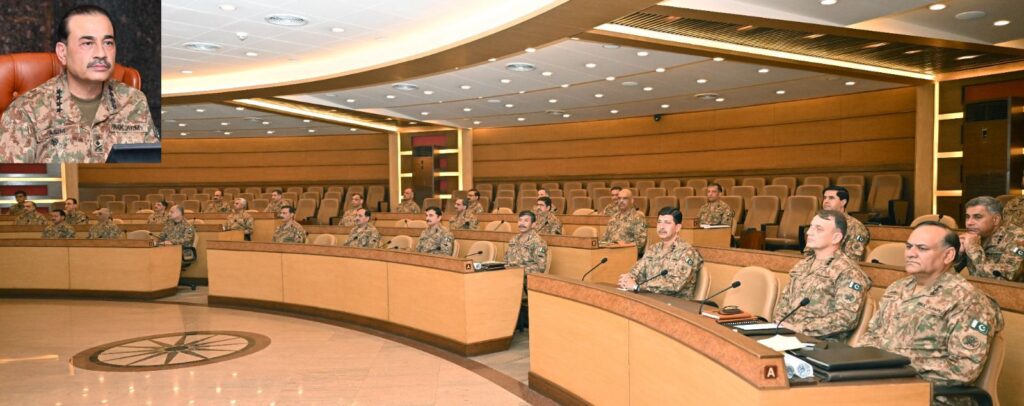At the 268th Corps Commanders’ Conference (CCC) held at the General Headquarters (GHQ), General Syed Asim Munir, the Chief of Army Staff (COAS), led an important discussion on Pakistan’s security, both internal and regional. The forum began with a tribute to the courageous sacrifices made by the nation’s armed forces, law enforcement agencies, and citizens, who have given their lives for the peace and stability of Pakistan. A moment of prayer, Fatiha, was observed in remembrance of these brave individuals.
The meeting then moved on to a detailed briefing regarding Pakistan’s current geo-strategic situation. The officers were briefed on emerging security challenges, including the evolving threats Pakistan faces, and the strategic responses being implemented to counter these challenges. A strong message emerged from the discussions: Pakistan is fully committed to eradicating terrorism in all its forms, no matter the cost.
The forum also stressed the importance of confronting the facilitators and abettors who work to destabilise Pakistan, particularly those influenced by hostile foreign powers. Pakistan’s military leadership made it clear that anyone attempting to disrupt peace, especially in Balochistan, would face strong opposition. They vowed to thwart any efforts, whether by foreign-backed proxies or local political elements, aiming to destabilise the province for their narrow political gains. The leadership assured the people of Balochistan that their sacrifices and support would guide the state’s response to these threats.
A key focus of the conference was Pakistan’s national strategy for combating terrorism and improving internal security, which is aligned with the National Action Plan (NAP). The COAS stressed that the implementation of Vision Azm-e-Istehkam, a comprehensive national plan, should be carried out with a coordinated, whole-of-nation approach. There would be no leniency in the enforcement of laws, and all state institutions were urged to work in tandem to ensure effective action against all elements seeking to destabilise Pakistan.
The COAS also praised the establishment of District Coordination Committees across Pakistan, a significant step in ensuring smooth inter-institutional cooperation for national security. These committees are expected to expedite the implementation of NAP and improve coordination between various governmental and security bodies.
In line with these efforts, the COAS reiterated that the Pakistan Army would fully support law enforcement agencies in cracking down on illicit economic activities that fund terrorism. “There is no space for terrorists and their facilitators in Pakistan,” he stated, underscoring the importance of cutting off the financial lifeblood of extremist groups.
The forum also expressed deep concern over the continuing human rights violations in Indian Illegally Occupied Jammu and Kashmir (IIOJK). They condemned the Indian Army’s unprovoked ceasefire violations along the Line of Control (LoC) and reiterated Pakistan’s unwavering support for the people of Kashmir, whose right to self-determination continues to be denied. The Pakistani leadership called for international diplomatic engagement to raise awareness of these ongoing abuses.
In addition, the forum expressed full solidarity with the people of Palestine, condemning the ongoing human rights violations and war crimes in Gaza. Pakistan’s leadership reaffirmed their strong political, diplomatic, and moral support for Palestine’s just cause.
As the meeting concluded, the COAS directed the military’s field commanders to maintain the highest standards of operational readiness and professional excellence. He emphasised the importance of rigorous training to ensure the armed forces remain at peak combat preparedness, ready to respond to any challenges that may arise.
The Corps Commanders’ Conference reinforced Pakistan’s commitment to defending its sovereignty, upholding human rights, and ensuring peace and stability in the region.





